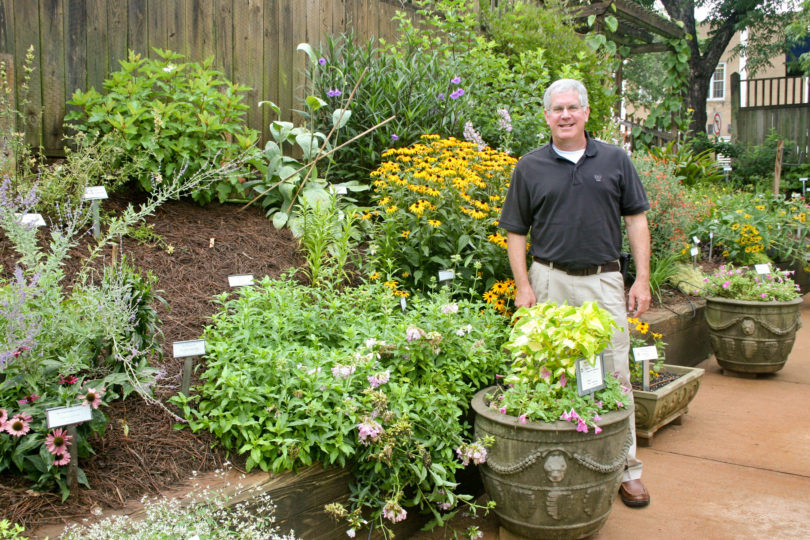After 30 years, the Trial Gardens at UGA—that green, flower-laden oasis sandwiched between Snelling Dining Hall and the College of Pharmacy—is being tended by a new green thumb.
John Ruter, a professor of horticulture in the College of Agricultural and Environmental Sciences, took over the day-to-day operations from garden co-founder Allan Armitage July 1. Armitage is retiring permanently-he retired in 2010 and came back part time-at the end of 2013.
Ruter spent more than two decades as a horticulture professor and a nursery crop research and extension specialist on UGA’s Tifton campus, where he also ran the Coastal Plain Research Arboretum.
He moved to the Athens campus in 2012 after he was awarded the Allan M. Armitage Endowed Professorship for Herbaceous Plant Instruction and Introduction. He now teaches classes in plant identification and environmental issues in horticulture.
Ruter doesn’t want to ruffle too many leaves as he eases into his new role, but he does want to spruce up the garden a bit-mostly planning changes to attract new visitors, allowing it to run more efficiently and using it for more horticulture classes.
“I’m just starting with it, but I do have lots of ideas,” Ruter said.
While the Trial Gardens is a testing ground for new plant varieties, it’s also a part of the horticulture department’s teaching and research programs. It’s important to Ruter to maintain all the facets of the gardens’ mandate.
Plant nurseries and breeding companies, who send hundreds of new plants each year to see if they can survive the hot and rainfall variable Southeast, fund the garden by paying to have their plants evaluated by an outside source. That money pays for the gardens’ upkeep and a team of student workers who keep the garden running.
While providing an important link the green industry, the garden is also a research lab where Ruter will work with graduate students to develop new plant varieties, and it is a classroom for plant identification and other horticulture courses.
Ruter plans to make the garden more useful as a teaching tool by planting more perennials and annuals that bloom in fall and early spring when more classes are in session.
This also will be good for the entomology, plant biology, plant pathology, landscape architecture and visual arts instructors who use the garden as an outdoor classroom.
“We’re still going to get some perennials in there for evaluation, and they will always be there,” Ruter said. “We will always have a majority of summer blooming plants, but maybe we can have some other things that we can use for teaching purposes and that can help make (the garden) a little more showy other times of the year-rather than just during the summer.”
Part of planting for a more diverse blooming schedule is also aimed at bolstering the garden’s reputation as a destination-both for visitors to the Classic City and for Athens residents. Support on-campus and from the general public will be integral to maintaining it as green space on campus for decades to come, Ruter said.
Like in every other part of the university, Ruter, Meg Green, the Trial Gardens supervisor, and her team of student workers and volunteers operate within new budget constraints. So, many of the changes he’d like to make have to do with increasing efficiencies.
The garden will remain open to the public on a daily basis and continue its schedule of public and industry open houses throughout the year.



